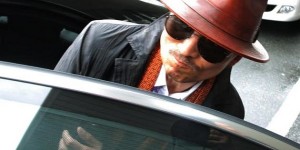
Kenichi Shinoda, the boss of Japan’s largest “yakuza” gang, the Yamaguchi-gumi, gets into a car after arriving at the train station in Kobe, western Japan on April 9, 2011 after he was released from a Tokyo prison after serving time since 2005. AFP FILE PHOTO/JIJI PRESS
TOKYO—A woman is suing the head of Japan’s biggest yakuza organized crime group, seeking a refund of protection money paid to gangsters threatening to torch her bar, reports said Wednesday.
The plaintiff is claiming Kenichi Shinoda bears “employer’s liability” as the don of the Yamaguchi-gumi because the mobsters were affiliated to his syndicate, broadcaster TBS said, in what is thought to be the first case of its kind.
She is demanding around 17 million yen ($17,000) in compensation and reimbursement for payments she was forced to make to protect her bar in the central city of Nagoya, the broadcaster said, citing her legal representatives.
The woman says she paid 30,000-100,000 yen per month between 1998 and 2010 to a member of Inabaji Ikka, a local yakuza group connected to the Yamaguchi-gumi, Kyodo News said.
On one occasion in 2008 when she tried to refuse to pay she was warned that her bar could be burned down, Kyodo said.
The Yamaguchi-gumi makes up more than 40 percent of the nation’s organized criminals, with about 27,700 members, according to the National Police Agency.
The plaintiff, whose name has not been made public, argues Shinoda bears ultimate responsibility for her losses as head of the nationwide umbrella organization of gangster groups, the reports said.
The lawsuit was encouraged by revisions to the historically weak anti-organized crime law in 2008, which pave the way for complainants to sue senior gangsters over their footsoldiers’ racketeering.
Lawyers say it is the first case of someone demanding recompense for protection money from a senior yakuza figure and comes as the owner of another bar begins legal action against Shinoda, claiming affiliated criminals burned down his business after he refused to pay protection money.
It also comes two months after the family of a man who was killed in that fire began setting out their case for compensation for the man’s death.
A local criminal court has previously found yakuza members guilty of murder in that case.
Like the Italian mafia or Chinese triads, the yakuza engages in activities from gambling, drugs and prostitution to loan sharking, protection rackets, white-collar crime and business conducted through front companies.
The gangs, which are not illegal, have historically been tolerated by the authorities, although there are periodic clampdowns on some of their less savory activities.
The yakuza are heavily mythologized in Japan, with films, television dramas and fan magazines glamorizing lives of stylized violence that are governed by a code of honor handed down from the samurai of yore.
But observers say the reality of the criminal underworld is one of brutishness and thuggery, where only a very few achieve the wealth and standing to which they aspire.
It was reported earlier this month that the Yamaguchi-gumi has published a magazine for its members that includes a poetry page and fishing diaries of senior gangsters, as part of efforts to strengthen solidarity in the face of growing societal animosity.